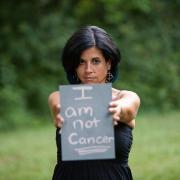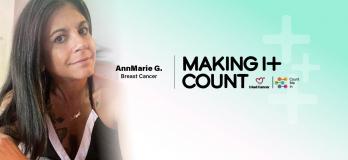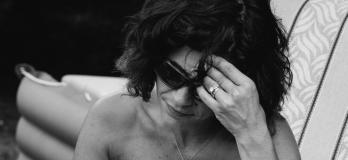One year after the cancer diagnosis that sent my life spinning into uncharted territories, my oncologist patted me on the back, told me he’d see me next year, and sent me on my way. I left his office, drove home, sat down on my couch, and sobbed for two hours. Ugly crying. Uncontrollable ugly crying. For two straight hours.
What the fuck had just happened to me?
From the outside, and certainly to my oncologist, it must have looked like I was in the home stretch of a scary chapter in my otherwise pretty good life. I had gone through surgeries and radiation treatments, facing my fears and medical challenges with the determined bravado I assumed was expected of anyone in my place. My four kids gave me a reason to look forward, my dear friends stepped up to help, and my dad and siblings lived close enough for regular visits. I had a roof over my head and decent health insurance. In the midst of my battles I had even managed to start up an advocacy organization to support other cancer patients and their families. Over the past twelve months, I had been called “brave,” “strong,” and “an inspiration,” but I felt like I was none of that. That morning, after receiving the news that I was cancer-free, I could have felt relieved, maybe even joyful. Instead, I felt mentally drained and emotionally untethered.
As I sat drenched in tears and snot, it occurred to me that, through it all, not one person had asked me about my mental state. To be clear, I am not just a cancer survivor. I am a suicide attempt survivor. I am a rape survivor. I live with depression and anxiety . My mental illness “rap sheet” is diverse and lengthy. In fact, when I was diagnosed with cancer, I was barely a year into my recovery from a dangerous bout of post-partum depression that had wreaked havoc on my marriage and my family life. I had been perilously close to the edge of suicide. Despite outward appearances, the fight to reclaim my life wasn’t over.
A year earlier, in the weeks before my cancer diagnosis, I thought I was doing a fairly good job of putting my last breakdown behind me. Mentally, I was feeling okay. Physically, I felt good—I had gained weight; I felt strong. With the help of medications and lots of therapy, I had clawed my way back into a life and routine that was working for me. The diagnosis hit me like a friend’s betrayal. Suddenly, the body that I’d always turned to for sanctuary was no longer my ally. Once again, I felt like a failure.
I was no stranger to self-defeating thoughts, but now my body seemed to be confirming the worst of them: I got cancer because I didn’t breastfeed long enough. I had multiple pregnancies and multiple miscarriages. I smoked cigarettes. I ate too much sugar. I didn’t pray enough. I was a bitch. In other words, the disease was my fault. In hindsight, that kind of thinking seems ridiculous, but at the time it felt completely rational. Later, when I shared these feelings about my cancer with others, I discovered that it’s a common, even expected, response but at the time, I felt like I was completely alone.
As the youngest of three siblings in a family forever damaged by the violent murder of my mother when I was less than a year old, I grew up with an unspoken understanding that my role was to lift everyone else up. After her death, our family and friends sought consolation in my innocence and in my obliviousness to the tragedy that now encompassed us. “The baby will help us!” “AnnMarie is so funny; she’ll cheer us up!” I always sensed that I had a job to do, even though I was too young to know what had happened to my mother. I wasn’t told about the circumstances of her death until I was almost ten years old. No one talked about it; they had lived it. They didn’t want to talk about it. They still don’t.
Growing up without a mother defined me. To compensate, I surrounded myself with substitutes—my grandmother, my aunts, my godmothers, my girlfriends’ mothers. When I was little, I made up scenarios about running into my mother. She isn’t dead, she just has amnesia. Maybe I’ll see her in the grocery store, and she will know me immediately. Her memory will come flooding back, and we will be reunited! I didn’t tell anyone about my fantasies, because I was just a baby when she died. I believed I wasn’t entitled to miss her, because I have no real memories of when she was alive—things like how she smiled, what she smelled like, or the sound of her voice—but the reality is; her sudden disappearance must have been devastating to me, to Baby AnnMarie who experienced a life-changing tragedy that no one talked about.
When I was a teenager, I tried to kill myself twice. No one ever talked about that either. They assumed I had just overdosed on drugs. They called me wild and said I was on the wrong path, but nobody ever thought to ask why. I was treated for addiction , but my depression was never acknowledged. I was depressed in part because everyone expected me to be happy. I had to live up to my pre-defined destiny. I couldn’t notbe the life of the party. It was my job to make everyone laugh.
To this day, I love that part of who I am. It makes me feel good to make other people feel good. That, in turn, helps my depression. But appearances can be deceiving—acting out and yucking it up doesn’t look like depression. Most people think depression means lying in bed for days, refusing to shower, sitting alone in a room with the shades drawn. That wasn’t me. I was lively, fun-loving AnnMarie, hiding the truth about how I felt from myself and from everybody else.
At fifteen years old, I was raped at a party. I had gotten drunk and was flirting with a guy that I knew was trouble because my soon-to-be ex-boyfriend hated him. It didn’t last long, but when it was over, my rapist looked down at me and said, “You’re not worth it.” Then he got up and walked away. I believed him. The incident left me with riddled with Ptsd and anxiety. Shortly thereafter, I made my first suicide attempt. Years later, when my older sons hit their mid-teens, I had panic attacks inspired by an irrational fear that they would rape someone.
After I was married, my pursuit of my ideal motherhood was ferocious. Acutely aware of my own mother’s absence, I was determined to be the best mother, and my expectations of myself were impossibly high. Clinging to the tiny bits and pieces I knew about her—she was a go-getter who chaired committees; she was a fashionista who ran a hair salon in her basement; her nieces and nephews adored her; my father adored her—I did everything to live up to who I thought she had been.
I was a good mother, but beneath the surface, I felt like a failure. I nursed Ben for “too long” and put Sammy on a bottle “too soon.” After the first two kids, punctuated by multiple miscarriages (more failure!), I stopped making baby food from scratch and started using jarred food instead. Ben started showing signs of OCD at about 18 months; I blamed myself. My pregnancy with my third son, Anthony, was miserable and his delivery was traumatic. He was a happy baby, but he was always on the move. Unlike Ben and Sam, he didn’t go to bed without a fight, and wouldn’t sleep through the night. I assumed I was doing something wrong. As always, I felt my mother’s absence; she would have had the answers I needed. I ached to know if her experiences with motherhood were similar to mine or completely different.
My pregnancy with my fourth son, Julian, was a happy surprise, but, just before I gave birth, my grandmother, who had helped to raise me, had a heart attack and passed away. Because I was nine months pregnant and they didn’t want to upset me, my family delayed telling me that she was in the hospital. By the time I got there, she was gone. I never had a chance to say good-bye. I was hurt, angry, and devastated. When Julian arrived, he was extraordinarily clingy. He wouldn’t let me leave him, ever. Whether he was with my husband, a babysitter, or the childcare at the Y, I would inevitably get a call: “He won’t stop crying. You have to come back.”I know now that this is part of the mental illness he suffers, but at the time I felt suffocated. I felt like I needed to free myself. I felt like a failure.
By the time Julian was around two-and-a-half, I felt myself breaking. I was exercising two to four hours a day and weighed 87 pounds. I ate bags of Skittles for breakfast, lunch, and dinner. My insomnia was through the roof. Alone with my kids during the day, I felt like the walls were closing in on me. When I tried to bring up my declining mental state to the people around me, they dismissed my growing panic. “Oh, you’re fine. You just need to get out and spend some time with your girlfriends.” So, I lurched back into my pre-motherhood comfort zone: out every weekend, life of the party, wild and crazy AnnMarie.
I started having suicidal thoughts again. I knew why I had to do it. I was exhausted and nobody was listening. No one saw my side. I looked around at my friends and they all seemed to be doing just fine. I felt like I was all alone. I felt like I was crumbling. I started formulating my escape; I made a step-by-step plan for taking my own life.
When I finally admitted to myself that I needed professional intervention, my life broke wide open. I had decided to seek help at a professional treatment center in another part of the country, but my husband didn’t understand my urgency or welcome the expense. I got a friend to drive me to the airport. Baffled and perturbed, Tom phoned me while I was waiting for my flight to be called. He told me to come home, that he might want a divorce. I didn’t get on the plane.
When I got back to the house, we launched into a full-on argument. It was ugly, and I knew as it happened that I was going to complete my well-laid plan to kill myself. Despite the horrible moment we were having, I had the presence of mind to tell Tom what I was thinking. I asked him to drive me to my therapist immediately, and even though he didn’t understand what was going on in my head, he drove me there. When I told her that I had a suicide plan and that I was ready to act on it, she checked me into the hospital for a mental health assessment.
After hours alone in a room with only a mattress, the clothes on my back, and the unyielding stare of the police officer assigned to watch over me, I got a bed in the psych ward at about two in the morning. Looking around me, I saw disheveled people talking to themselves. There was a man running screaming down the hall, with several staff members chasing after him. Here I was; a soccer mom from a nice little suburb in Central New York, surrounded by mayhem, confined at my own request, because I was afraid I would harm myself. Yet again, I felt like a failure.
I did my time in the hospital, figured out my meds, made the most of group therapy, and came home. I worked hard to recover. I felt better. And then I got cancer.
I had a lumpectomy.
I had a double mastectomy.
I had radiation.
I had reconstructive surgery, which failed, so I had to have it reversed.
In the wake of my treatments for cancer, I developed lymphedema. By the time I found myself sitting in my oncologist’s office for the one-year follow-up, listening to him congratulate me on a job well done, I was experiencing a shit-storm of side effects. My whole right side was numb. I had pain that I couldn’t explain. When I tried to talk about it, I was told it was all in my head. “It’s stress.” “Take a muscle relaxer.”“You’ll be fine!” As a woman with paranoia and a lifetime of feeling unworthy, who lacks confidence and assumes that other people are all smarter than me, I believed them. I let it go. A year later, I would be diagnosed with multiple sclerosis.
I’d like to say that my two-hour torrent of tears had a healing effect on my spirit, if not my body, but I don’t think it did. Yes, it was a much-needed release, but as the wave of emotion faded, what I experienced felt more like resignation. I was still fighting for my life. Despite glib reassurances from all sides, I had work to do, and I had to do it myself. My kids need their mom. I had an organization to run, a network of people that relied on me, and dinner to cook. “I am worthy,” I told myself and took one more deep breath. Then I stood up and began again the relentless uphill battle of convincing myself that it was true.
I started blogging to keep my family and friends informed about what I was going through and unintentionally discovered that my story matters to people that I don’t even know. I began to work as an on-call advocate for organizations that support cancer patients and their families. I started receiving invitations to speak about cancer and, later, about mental health issues, at conferences and seminars. All of it helped me to heal. But was it ever enough?
One friend, who has since passed away, encouraged me to continue speaking out. “Be my voice,” she urged. Today, whenever I Tweet, or post a new blog entry, or speak at an event, someone reaches out to tell me how deeply my words resonate. When I engage with people who are suffering, and when I can help someone feel less alone, I am filled with relief. My voice matters. What I have to say about my experience is vitally important. And speaking out for someone who can’t speak up is hands down the best therapy I’ve ever had. I would miss that feeling so incredibly much. I would miss the part of me that some may not understand the part that makes me who I am. I would miss knowing I am worthy.











